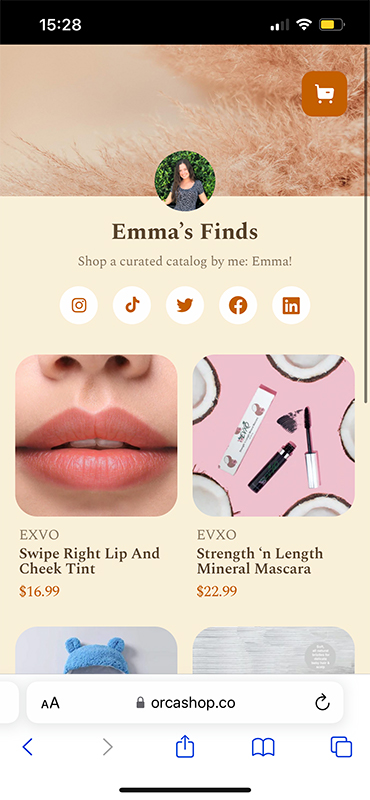If digital content creators want to make money through physical products, they generally have two options: make and sell their own merch, or hook up with a company and promote its products to their viewers.
Creators who choose the latter option can be paid a one-time, lump sum of money—for example, they might get $2,500 for a 15-second ad spot in their latest YouTube video. Or they can make money on a rolling basis through an affiliate program, where they earn a percentage every time someone follows their custom link and buys something from the company’s store.
Things have been this way for years. Merch or sponsorship. Lump sum or affiliate links.

Subscribe to get the latest creator news
Now Orca wants to be another option.
Orca was founded in 2020 by former Studio71 executive Max Benator, veteran producer Lauren Stevens, and actor/producer Rachel Ramras. So far it’s received funding from Warner Bros. Discovery chief strategy officer Sean Kisker, pocket.watch CEO Chris Williams, MrBeast president Marc Hustvedt, Mekanism’s Brendan Gahan, and Doing Things Media co-founders Derek Lucas and Reid Hailey.
The company partners with select businesses and brings all their products together in one big catalog. Content creators can then sort through that catalog and make their own Orca shopfronts stocked with hand-picked items like DIY bubble tea kits, sustainable skincare lines, and jewelry made from recycled metal.
After their digital shop is made, creators can be pretty hands-off. Sure, they have to promote it to their followers, but on the business side, their part is essentially done. They don’t have to deal with stocking or fulfillment—that’s done by the companies themselves—and if they ever feel like they need to add more products, they don’t have to sit down with a design team; they just have to look through Orca’s catalog.
And that’s the point, Benator tells Tubefilter.
Not every creator wants to launch their own products. That’s cool, Orca says.
“Making products is hard,” he says. “Even if you’re a celebrity, it’s difficult to create your own product line.”
Some creators, he says, simply don’t have the time or the desire to get into making their own products. But they still deserve a way to make substantial income on a rolling (and fairly passive) basis.
“There are affiliate programs out there, but even that requires a little bit of an entrepreneurial mindset that not everyone has,” he says. “And the average affiliate fee is about 2.5%.”
When something is purchased from a creator’s Orca shop, they make 20% of the sale price.
“So on a $40 sale, you make $8,” Benator says.
Orca began opening up to content creators earlier this year, and currently sees one new shopfront launched “every half hour, every day, 24 hours a day,” Benator says.
This month, the company debuted a tool that lets creators add social account links to their Orca shopfronts, instead of adding their Orca shop as one link on a link-in-bio product like Koji or Linktree.
Garrett Perkins, Orca’s product manager, is the one who came up with the idea to offer social links.
“We’ve learned that one of the most important things for our creators is staying connected with their audience across their entire online presence,” he says, “so we created this as a way to centralize that presence while having Orca as their primary link.”

Orca’s social links in action.
Benator says Orca is also in the process of developing a sharing tool. “Say you’re at a party and you’re wearing a shirt or a hat that’s in your storefront,” he says. “And one of your friends is like, ‘Oh, that’s awesome. Where did you get that?’ You can say, ‘I’ll send you a link,’ and hit a share button that actually send them to your page.”
Orca wants to match creators’ niches, from automotive to art
Orca can’t share the exact number of creators or companies it’s working with, or details about how much money creators are making through its shopfronts, Benator says. He does say that right now, Orca offers thousands of products, and that eventually it aims to offer hundreds of thousands across a wide variety of niches.
“At that point, discovery is going to be really important,” he says. “We’re already starting to work on tools that will allow for, if a creator comes in and they’re a tennis creator, we’ll surface the best products for tennis, as an example.”
Orca is also particularly interested in bringing on more products from companies owned by women and members of marginalized communities, Benator says.
“We’ve always sought out independent brands, female- and minority-owned brands,” he says. “We’ve sought diversity and to be as inclusive as possible with our product partners.”
Benator says that right now, Orca’s team is small, and “we’re limited in terms of our outreach” to new companies. “But we pay close attention to what’s trending and what’s popular,” he says. “Then it’s, do we believe in it too? Do we get excited about it as a product? Do we believe in the mission of the brand?”
He adds that 90% of the companies Orca approaches are “excited about coming into our catalog.”
Ultimately, Orca wants to be a win-win for creators and sellers, he says.
“We empower anyone to become a small business owner,” he says. “Anyone can sign up to become a seller on Orca. It doesn’t matter where you are or where you come from. And similarly, for our brands, we don’t ask for any commitments from them. They get a whole new sales channel with the trusted connection between a creator and their audience.”








